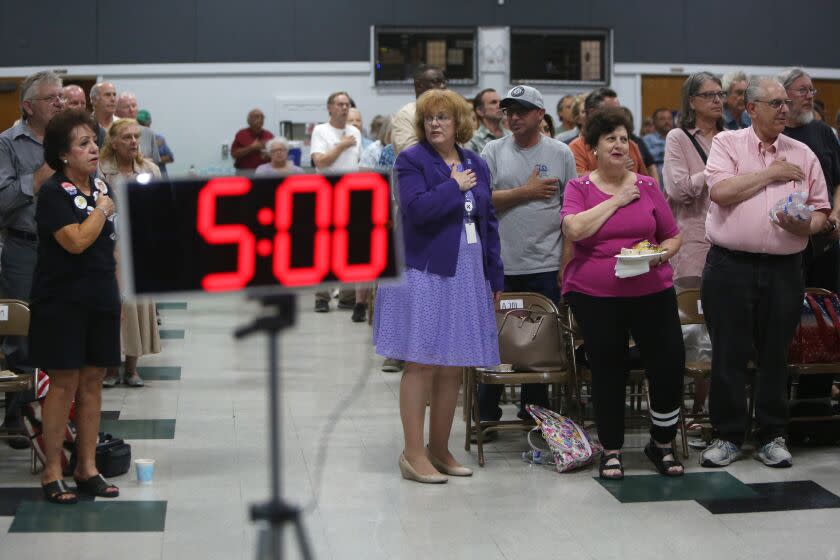Letters to the Editor: If we're a nation 'under God,' what about nonbelievers?

To the editor: Thanks to Nicholas Goldberg for addressing an issue that I contended with throughout my years in public school. As a lifelong atheist, I have always objected to forced public displays of religious belief. ("Is the Pledge of Allegiance just an empty, performative ritual?" Opinion, March 20)
The words "under God" should be removed from the Pledge of Allegiance. And, as Goldberg argues, perhaps we should remove the entire pledge and replace it with an ode to the Bill of Rights.
Frances Segal, Rancho Mission Viejo
..
To the editor: Goldberg could not be more wrong about the Pledge of Allegiance. I have always interpreted "one nation, under God," to mean "one nation, under a power greater than our individual selves." This applies to everyone, regardless of religion or lack thereof.
We must value the national rituals that bind us together. Reciting the pledge and singing the national anthem are the opposite of performative, empty symbolism — because without them we're a nation fractured into millions of myopic, quarrelsome individuals nursing their personal grievances.
I'm not sure what will put us back together, but it sure doesn't help to keep attacking reminders like the pledge that this nation, with so much progress still to be made, remains something larger and better than any of us.
Let's stress our commonalities and celebrate our country, which allows for broad criticism while striving always to become better.
Ann Bowman, Santa Monica
..
To the editor: During my tenure as a teacher in the Fontana Unified School District, I taught several students who did not recite the Pledge of Allegiance due to their Jehovah's Witnesses faith. The students would stand at attention, would not place their hand over their heart, and remain silent.
The Supreme Court decision in the 1943 case West Virginia State Board of Education vs. Barnette, which Goldberg cites, centered on Jehovah's Witnesses. As a result of this decision, my students' right not to recite the pledge was protected.
Rather than question my students' loyalty to the U.S., I welcomed the chance for my classroom to serve as a laboratory where daily successful experiments were conducted protecting my Jehovah's Witnesses students' constitutional rights. In the process, students of other faiths exercised their rights and observed how the Constitution should work.
Emilio Alvarez Jr., Fontana
..
To the editor: Goldberg writes, "As a nonbelieving American, I'm put off, to say the least, by the reference to God in the pledge."
As a believing American — a born-again Christian — I refuse to pledge allegiance to the flag of a temporal nation because my primary allegiance is to the Lord Jesus Christ.
While I am willing to stand with my fellow Americans as they recite this litany of performance patriotism, I choose to remain silent because such a pledge is contradictory to my Christian faith.
Emery J. Cummins, San Diego
This story originally appeared in Los Angeles Times.

